Samsung Galaxy Nexus & Ice Cream Sandwich Review
by Brian Klug & Anand Lal Shimpi on January 18, 2012 1:34 PM ESTWiFi
The Galaxy Nexus uses Broadcom’s BCM4330, which is starting to pick up steam and become just as ubiquitous as the BCM4329 it replaced. The Galaxy Nexus’ BCM4330 includes both 2.4 and 5 GHz WLAN connectivity, just like the SGS2 in fact. What’s particularly notable is that Android 4.0.x now includes the proper prioritization for each WiFi band, and also includes the ability to set preference for one band for the other. By default, when faced with the same SSID on both 2.4 and 5 GHz, the Galaxy Nexus correctly chooses the 5 GHz AP if the signal is favorable, then falls over to 2.4 GHz when its link quality on that band would be better. Other than this notable change, the remainder of the WiFi settings panes are unchanged. The WiFi sleep preferences and the main scan and connect page does get a minor facelift and change, however.
The Galaxy Nexus latched onto my 802.11n APs on both 2.4 and 5 GHz and used 20 MHz long guard interval rates at 65 Mbps the same as other BCM4330 based devices. Throughput is unsurprisingly very good on the Galaxy Nexus in our WiFi test, which consists of downloading a 100 MB PDF hosted locally over WiFi. Of course, since we can now control and choose which band the device uses, I tested on both 2.4 GHz and 5 GHz, both with a negotiated link rate of 65 Mbps.
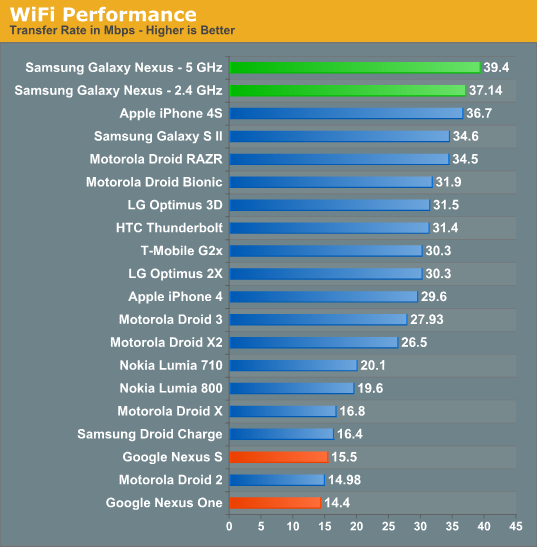
WiFi range on the Galaxy Nexus is good as well, I can make it to the same place before hopping off my network as other devices. I have gotten a few emails and read reports about power-save mode incompatibility with some APs that causes it to drop off when on standby mode. Since we've seen BCM4330 work just fine on other devices, I have no doubt this is a software issue which will be fixed soon.
Speakerphone
As usual I also measured speakerphone volume on both variants of the Galaxy Nexus using a sound datalogger. There is apparently a difference between the two models, possibly from different acoustical chambers in the vibration unit and antenna. Also there’s possibly still a difference as a result of the different voice coders in use, and the different dynamic range.
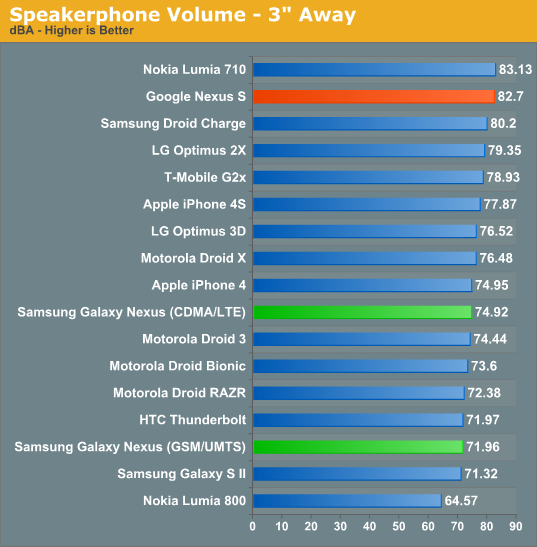
Either way, the two test differently, and subjectively my experience backs those measurements up. I found the GSM/UMTS Galaxy Nexus a bit too quiet while using Google Navigation, and the CDMA/LTE Galaxy Nexus on the quieter side but totally useable for Navigation.
GPS
Just like the SGS2, the Galaxy Nexus uses a SiRFStarIV GSD4t for GPS. Subjectively the Galaxy Nexus GPS doesn’t lock quite as fast as some of the other GNSS solutions that are integrated into the cellular basebands in phones, but it does get the job done pretty fast. I see a time to first fix of between 4-7 seconds depending on visible sky swath presented to the handset.
I did receive a few emails from readers with reports of some Galaxy Nexuses shipping with GPS issues or taking too long to lock. One of my friends with a CDMA/LTE Galaxy Nexus also reported that he couldn’t get a GPS lock at all for Google Navigation. I’m not entirely sure what the deal is here since I never was able to encounter this behavior, although manually downloading the A-GPS data (ephemeris) using a tool like GPS Status seems to in general helps mitigate those problems when they do happen. This just manually re-downloads the xtra.bin file from http://xtra1.gpsonextra.net/xtra.bin as configured in gps.conf. I have to admit that I didn’t encounter any GPS issues in my time with the Google Nexus (CDMA/LTE or GSM/UMTS version) so far.
Audio
We’re going to do a more in-depth audio analysis with the Galaxy Nexus when we have our testing suite more fleshed out, and possibly bring you Francois Simond’s thoughts once more. For now however, we have some RMAA runs I talked about a while ago in another review, and my own impressions with Galaxy Nexus sound after using the device for a while now as my primary music player with some Shure SE535s.
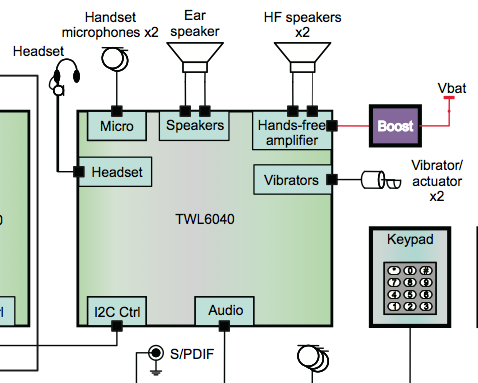
First off, the Galaxy Nexus out of the box is pretty decent subjectively. The Galaxy Nexus uses TI’s TWL6040 low power audio codec for its DAC and other audio responsibilities, alongside the vibrator actuator. We’ve seen some other TI audio codecs (like AIC3254 in the HTC Sensation) but this our first time seeing TWL6040. Almost immediately I noticed that there isn’t any constant high frequency whine present like I’ve heard on so many phones lately (Bionic, SGS2, others), and it’s hard to hear any noise when the DAC turns on and off after music stops playing. Even plugged into USB power, the device also doesn’t pick up any more noise or change at all. There’s also almost no CPU noise, though if you listen very carefully you can indeed hear some state changes, but it’s very minimal and very difficult to pick out.
Though the frequency response isn’t entirely flat as shown, the Galaxy Nexus doesn’t sound bad subjectively. Our testing here is just a RMAA run from line out on the devices to line in on an ASUS Xonar Xense sound card. In addition, testing is done at 44100/16 bit on the devices - Android will downsample anything more than this.

From 20 Hz to 20 kHz: +0.10, -0.62 (dB)
Noise on the Galaxy Nexus also isn’t bad, definitely better than the RAZR we tested earlier.
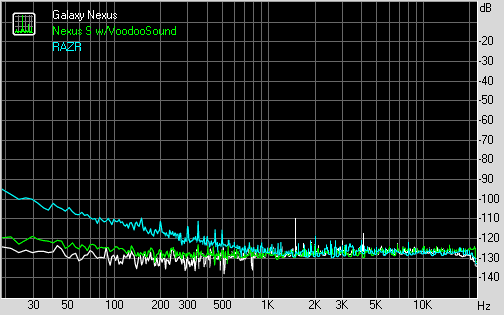
Noise Level: -96.2 (dB, A weight)
Dynamic range shows the difference in level between the maximum output and minimum output on the smartphone. This is limited by voltage swing and system noise. Galaxy Nexus again here looks pretty good, minus a few spikes.

Dynamic range: 96.0 (dB, A weight)
The two total harmonic distortion charts are next, which are the summation of integer multiples of the test frequency and expressed as a ratio of the input signal (in this case at 1 kHz). THD+Noise gives all frequencies except the input signal. The Galaxy Nexus is pretty good here, but still has some spikes at a few noteworthy integer multiples, plus some odd spikes at high frequencies.
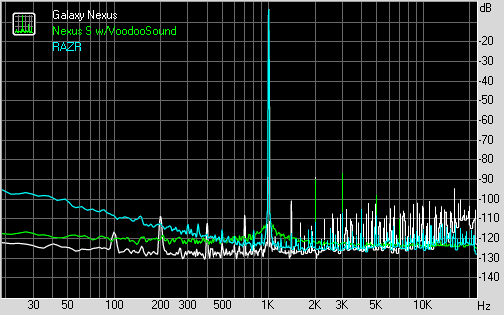
THD %: 0.0088
Intermodulation distortion is similar to total harmonic distortion, however it applies two input signals and then measures the signal at all frequencies except the two inputs. In this case, the two signals are on opposite sides of the spectrum. Galaxy Nexus ends up not looking too bad here although there are disconcerting spikes above 1 kHz that I can’t explain.
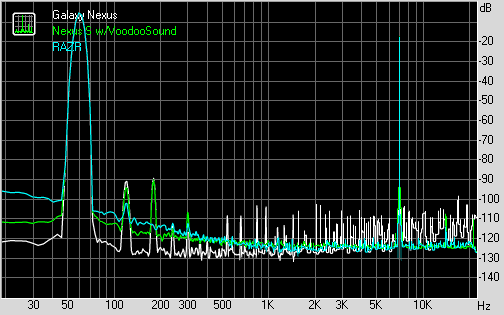
IMD + Noise %: 0.013
Finally stereo crosstalk is pretty flat on the Galaxy Nexus.

Stereo Crosstalk: -87.4 dB
Again, this isn’t meant to be a totally comprehensive analysis of the Galaxy Nexus’ sound characteristics, just some educated impressions. Subjectively the Galaxy Nexus sounds nice and clean, and is absent of the annoyingly audible background noise and whine that’s present on some of the other noteworthy phones we’ve tried as of late. Francois (supercurio) has expressed a few times that the Galaxy Nexus has good audio potential, and that alone should tell you something.


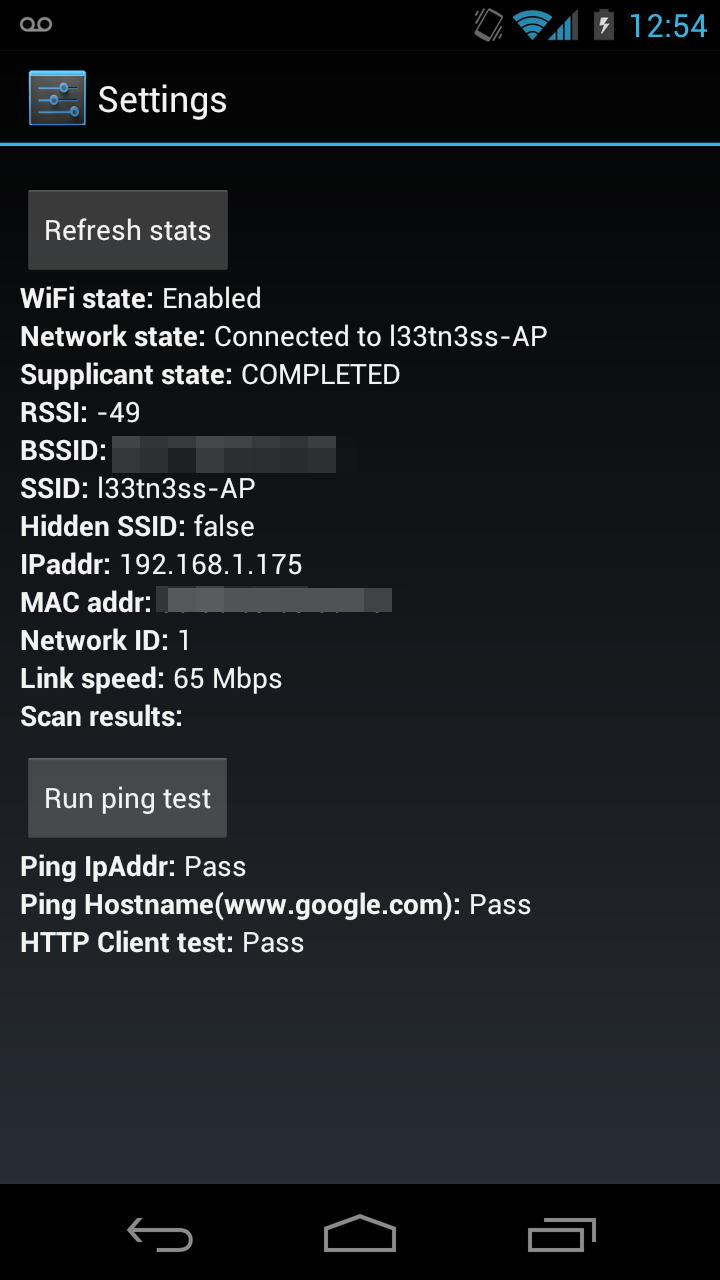
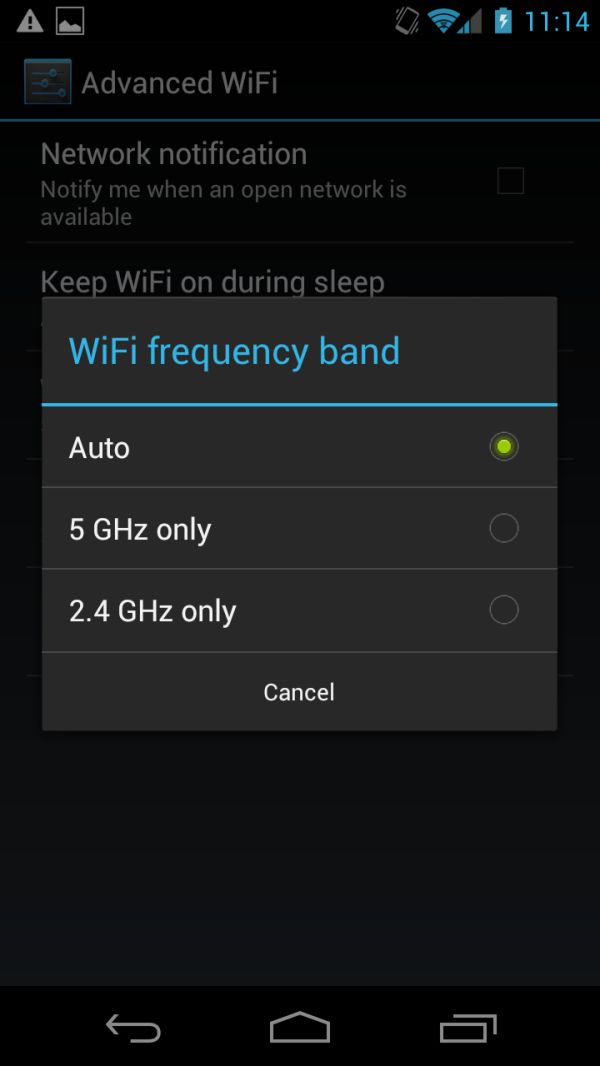
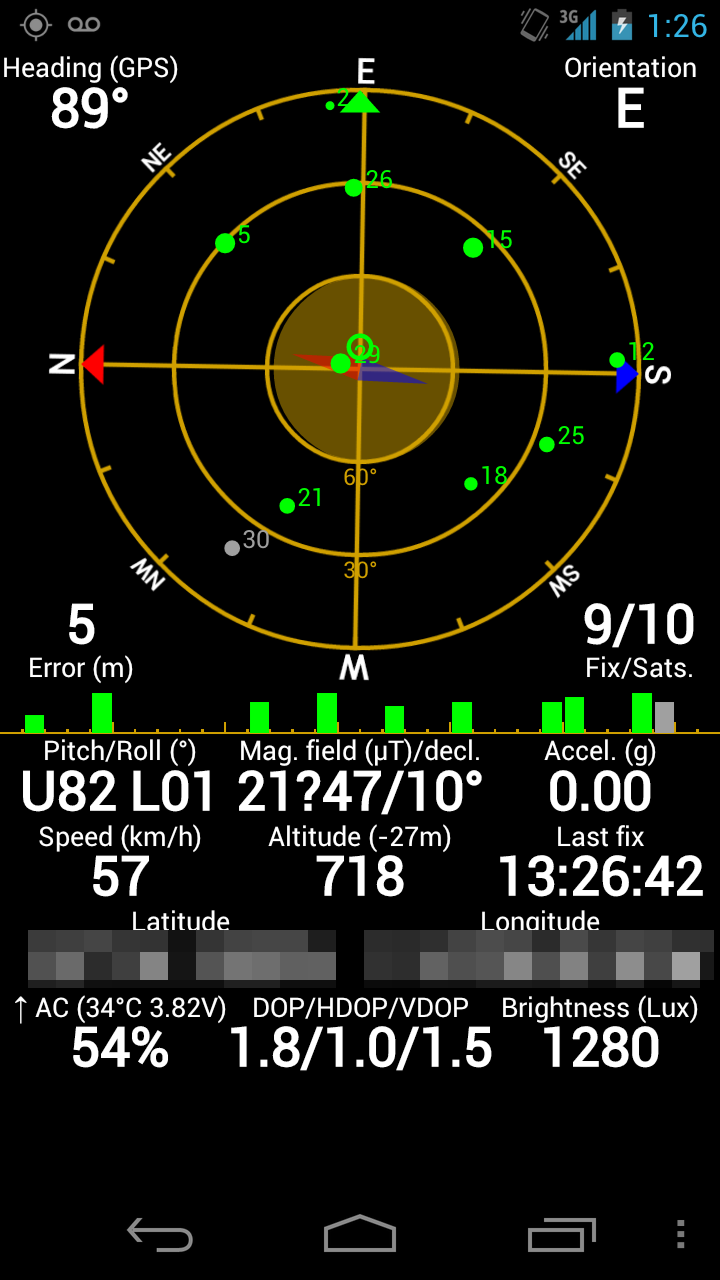








185 Comments
View All Comments
gamoniac - Wednesday, January 18, 2012 - link
The article is co-authored, yet I keep seeing the use of "I" as the pronoun in sentences throughout. As a daily AT reader, I find it a bit awkard when trying to put a face to the article. I like the writing style; it just bugs me when I can't figure out whether it is Anand or Brian who is making the statement that I am reading. Perhaps the use of "we" makes more sense?Thanks. Great work as usual.
Omid.M - Wednesday, January 18, 2012 - link
As an editor, I agree with this comment.It's not a huge deal, but it's nice to see:
AL: I think that...
BK: I disagree with Anand, but...
Just don't do it everywhere because it'll seem like an interview.
Anand,
The videos have been the best new thing AT has done in a long time. Thanks! Good to put faces to names, even better to add voices. Next, comment system ;)
@moids
-Omid
bjacobson - Wednesday, January 18, 2012 - link
Perhaps writers at Anand should be required to speak in terms of The Collective.Brian Klug - Thursday, January 19, 2012 - link
This is definitely something we've struggled with in the past and admittedly continue to struggle with. Most of ICS is Anand (though we collaborated and always wind up agreeing about most things), then the hardware and onwards is myself.Think of us as a hivemind (or collective) and the problem goes away :P
-Brian
Zoomer - Thursday, January 19, 2012 - link
Or write in 3rd person like a technical paper. Though that can be boring to read.just4U - Friday, January 20, 2012 - link
"Think of us as a hivemind (or collective) and the problem goes away :P-Brian"
------
It does NOT!! Ok, which bonehead asimilated Brian & Anand? There goes the neighborhood (...grin)
thebitdnd - Wednesday, January 18, 2012 - link
I've had my GNex since the day after launch. It surpasses any experience I've had with a smartphone (including HTC Incredible, iPhone 3GS, and a HTC EVO) as a web browser and mobile computer device, but the single complaint I have is with using it as a...(wait for it) PHONE.I've had over a dozen calls now where I'll be conversing away and all of the sudden my microphone cuts out and the other person can't hear a word I'm saying. The call is still connected and I can hear them just fine, but I have to hang up each time and call them back.
Google directed me to Verizon, Verizon says it's a Samsung/Google problem, but I've been assured it's a software problem and there will be a fix in 'an upcoming update'.
As much as I like the hardware and software, not making reliable calls is a real kick in the junk for a smartphone.
jalexoid - Wednesday, January 18, 2012 - link
Well, what did you want with CDMA or LTE? No bugs?mhaager2 - Wednesday, January 18, 2012 - link
Great review as always Anand. My only criticism is that it felt like it took you a very long time to get this review out compared to how quickly the iphone 4S review came out. I think your comments about the hardware are correct; its certainly not leaps and bounds ahead of other phones. Being my first phone since the iphone 3G I do wish it was more bleeding edge to future proof it a bit. However it actually works very well, both as a content consumption device, as well as (gasp) as a phone, and I just love, love, love that fact that its penta band. Now when I visit the US I no longer have to endure the legal extortion that used to be the norm with carrier locked devices. That feature alone makes this phone better than any other out there,, old GPU and all.Has anyone overclocked this to its 1.5 ghz spec? I wonder if there is any appreciable differerence and what the battery life trade off is.
tipoo - Wednesday, January 18, 2012 - link
I can only speak from my experience with my Nexus S, but the max CPU speed has little battery life impact compared to the impact the CPU governor does. 1.3GHz with the Lazy governor (available in Trinity Kernel) lasts longer than the stock 1GHz on OnDemand.